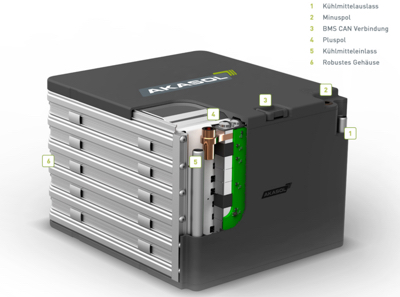AKASOL GmbH
Triathlon-class battery systems. E-mobility battery modules by AKASOL achieve excellent results in long-term endurance tests
Strong, long-lasting and well-balanced
One of the most critical issues for electrically powered vehicles is ensuring the long service life and consistent performance of their battery systems. Over the course of an eight-month endurance test, the experts at German e-mobility pioneer AKASOL subjected the latest generation of the company’s battery modules, AKAMODULE 46Ah and 53Ah, to a range of extreme conditions. The test generated a wealth of impressive data. The most relevant result is that, due to the module’s liquid-cooled design (developed in-house) and extremely homogeneous conditions for the battery cells, the service life of the batteries can be extended by up to 50 percent when compared to the manufacturer’s specifications. For example, the modules, which are usually used at temperatures of around 25 degrees Celsius, were still able to operate at extreme temperatures of between 50 and 55 degrees Celsius due to their high level of endurance. "Even after over 8,000 full load cycles for the 46Ah and 3,000 full load cycles for the 53Ah, the modules were able to retain around 80 percent of their original capacity. They were even able to continue to run on a residual capacity of 30 percent, thereby enabling a total of 15,000 cycles to be completed. The uniform deterioration of the individual cells is another satisfying result, as this significantly reduces the loss of capacity in the assembly. This means that the end of the battery’s service life is delayed until much later on,” explains Dr. Björn Eberleh, Head of Project Management, Testing and Service at AKASOL GmbH.
In a test environment set up in house, the AKASOL engineers subjected their 46Ah and 53Ah battery modules to extreme conditions. At temperatures of 50 to 55 degrees Celsius, the battery components worked for 1.5 years in full cycles at a constant load of 100A. The measured values in terms of capacities, differences in cell voltage and internal resistances confirmed the prognoses of the battery experts. In some areas, their expectations were even exceeded. "The AKAMODULE 46Ah and 53Ah models go far beyond the service life specified by the manufacturer of the battery cells, exceeding them by up to 50 percent. This is due to the liquid-cooled module developed in-house and the homogeneous integration of the cells. In a typical application, such as a fully electric city bus, the battery would still be in service after it reaches the million-kilometer mark,” states Dr. Eberleh.
A long service life thanks to a state of equilibrium
As disparities in the production of the cells and various operating conditions lead, in practice, to the cell charges within a particular energy storage unit becoming uneven, the battery management system must be able to bring the individual cells to the same charge level. In a multi-cell battery, this act of balancing enables the capacity of the entire system to be utilized on a long-term basis. As Dr. Eberleh states, "Our 46Ah battery module only had to be rebalanced once during the entire test period, which consisted of 8,000 full load cycles. Usually, battery management systems have to perform the same balance control over ten times more often to ensure that the cells deteriorate evenly and guarantee that full capacity continues to be available.
Further information:
AKASOL GmbH, Katja Steinhauser
Landwehrstraße 55, 64293 Darmstadt, Germany
phone.: +49 6151 80 05 00-140
fax: +49 6151 80 08 00-129
katja.steinhauser@akasol.com
www.akasol.com
Press and public relations:
Press’n’Relations GmbH, Uwe Taeger
Magirusstraße 33, 89077 Ulm, Germany
phone.: +49 731 96 287-31
fax: +49 731 96 287-97
ut@press-n-relations.de
www.press-n-relations.de
About AKASOL
AKASOL GmbH has developed and manufactured mobile and stationary high-performance battery systems for the German and European market for 25 years. Its multi-award-winning storage solutions are used primarily in the automotive and commercial vehicle industries, the off-highway industry, and the solar power and wind power sectors.

